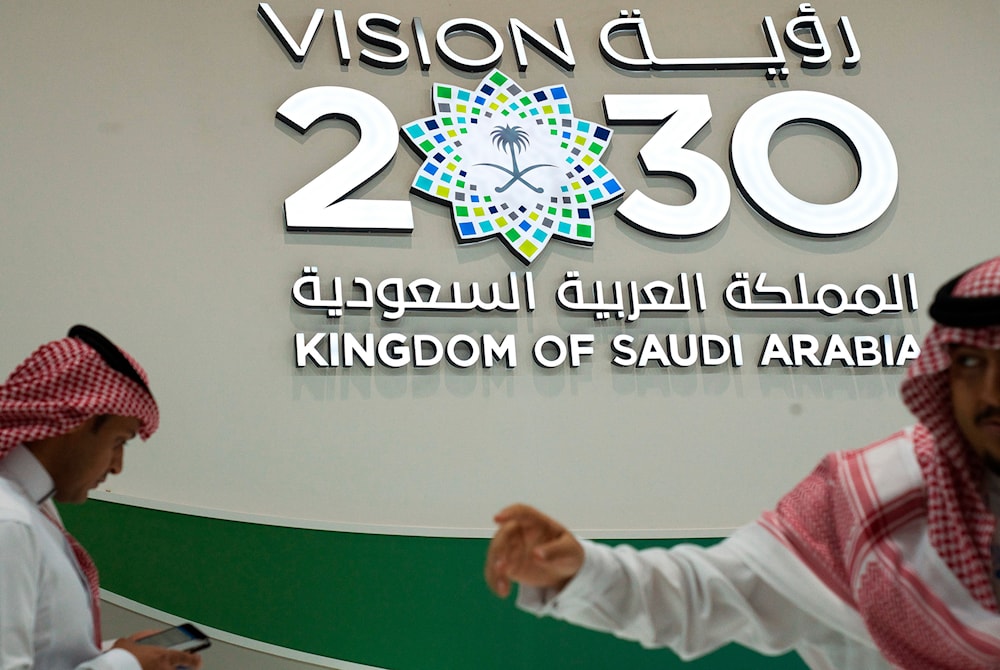Edmond de Rothschild Bank to establish presence in Saudi Arabia
The Edmond de Rothschild Group is expanding in the Middle East as Saudi Arabia becomes the latest hub for European financial institutions.
-

Saudi men walk past a "Vision 2030" display at a stand about Saudi Arabia during the World Energy Congress in Abu Dhabi, United Arab Emirates, September 10, 2019. (AP)
The banking institution of Edmond de Rothschild Group is set to establish a new office in Saudi Arabia this year. Alongside this expansion, the Swiss bank plans to launch a platform dedicated to providing debt finance for infrastructure projects within the Gulf state, according to a statement released on Thursday.
This strategic move aims to support Saudi Arabia's ambitious Vision 2030 initiative, an economic diversification plan led by Crown Prince Mohammed Bin Salman.
The Vision 2030 agenda seeks to reduce the country's dependency on oil by fostering growth in various sectors, such as infrastructure and urban development, though finding investors has been quite the challenge.
In collaboration with SNB Capital, Edmond de Rothschild plans on establishing the financing platform to support infrastructure projects across Saudi Arabia. The two entities announced this partnership through a joint statement.
Edmond de Rothschild, with over €5 billion ($5.4 billion) in assets under management in infrastructure debt, has also entered into a joint venture with Watar Partners, a venture that will provide infrastructure debt advisory.
The partnership, along with the new office in Riyadh, is expected to be operational in the latter half of this year.
"This is a logical next step for our group, building on the long-standing business relationships we have with the country," said Ariane de Rothschild, CEO of the Geneva-based bank, in the statement.
This expansion follows Edmond de Rothschild's recent expansion in the Gulf region, including the establishment of an advisory office in Dubai, United Arab Emirates, last year.
Vision 2030 on shaky grounds
Bloomberg revealed back in April that Vision 2030 plans were on shaky grounds as the Kingdom finds itself having to pay out of pocket for investors to come rather than the other way around, leading to a financial bleed in the oil-rich country's funds.
Despite this, the country aims to reach $100 billion in foreign direct investment (FDI) annually by 2030, a goal significantly larger than its historical achievements and about 50% more than what India currently attracts.
From 2017 to 2022, the Kingdom averaged just over $17 billion in annual FDI inflows. Meanwhile, the 2023 FDI target is set at about $19 billion according to the country's Investment Ministry.
Reaching the 2030 goal appears to be unattainable presently, with foreign investors showing caution, Bloomberg reported, citing bankers, legal advisors to investors, and individuals knowledgeable about Saudi Arabia's fundraising efforts.
This cautious approach has prompted the government to reassess its strategy, considering the possibility of financing a larger portion of its economic transformation itself, within a tight timeline.
Despite some foreign companies agreeing to joint ventures at Neom, Riyadh still bears the responsibility of financing nearly all of the cost, which is approximately half of its current economic output.
Finance Minister Mohammed al-Jadaan has acknowledged a funding gap and indicated the possibility of issuing additional debt. He has been involved in a committee led by MBS that analyzed Vision 2030's extensive funding requirements and compared them with the Kingdom's projected revenue.

 3 Min Read
3 Min Read








